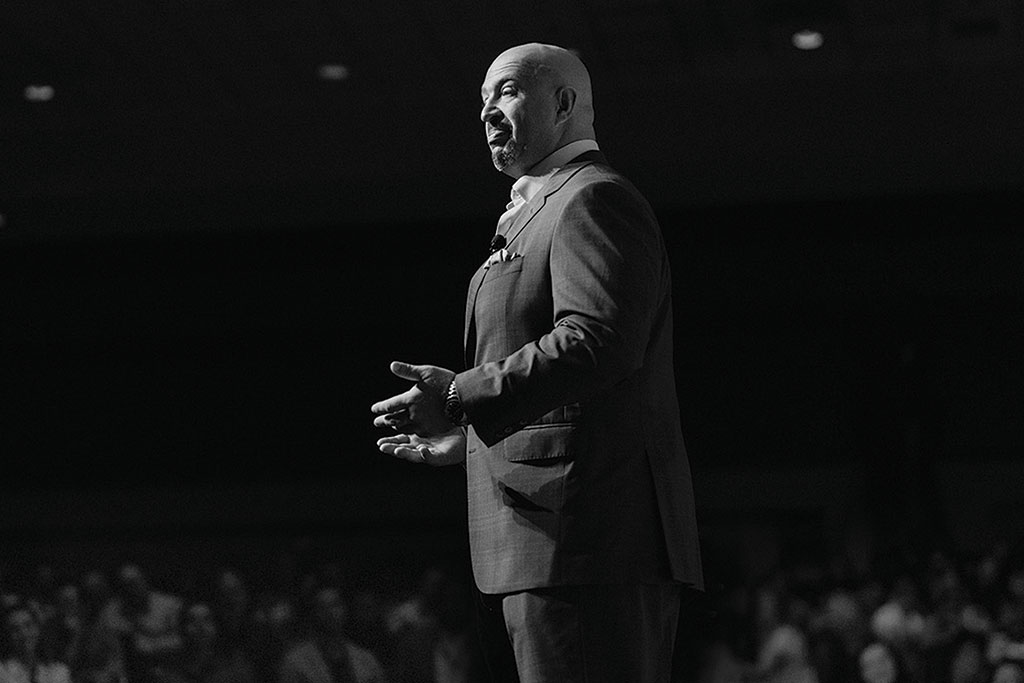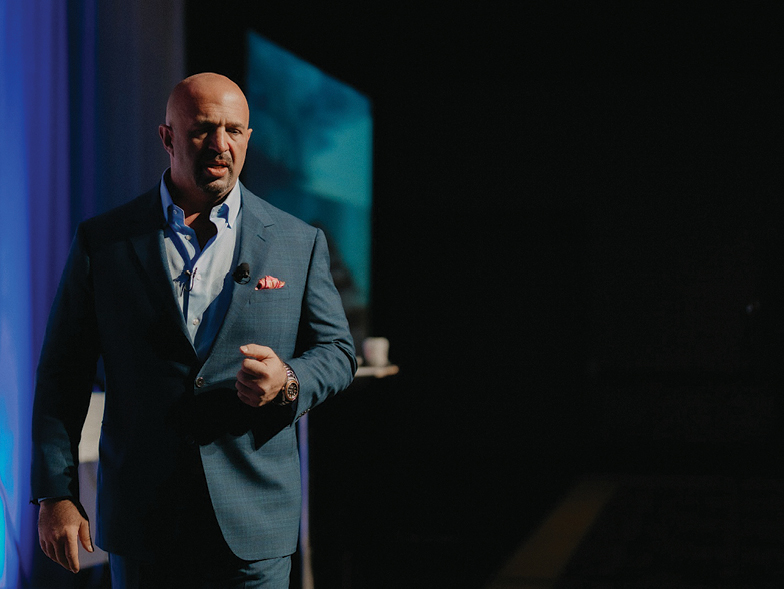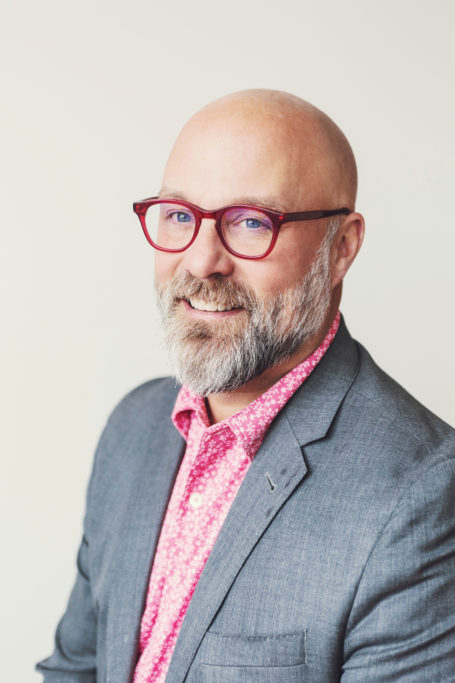The Neuroscience of Business
Leadership expert, keynote speaker, and best-selling author René Rodriguez delves into the qualities that can help you amplify your influence and earn trust.
While some people know their career path from the time they’re young, that doesn’t always mean their ultimate journey is a smooth one. Many find themselves climbing quickly to what they think is their destination only to abruptly hit a dead end instead.
Take René Rodriguez, for example. His life reached a crossroads during his sophomore year at the University of St. Thomas in Minnesota when he was cut from the school’s basketball team. “I was devastated,” he reveals. “I thought I was going to play in the NBA. That was my dream.”
Left without a plan B, Rodriguez got a much-needed jolt of inspiration from his mother, who gave him an odd task: to look around the room they were in and determine what everyone had in common. “I tried to figure out whether it was their skin color, where they were from, or what they were wearing,” he shares. “None of it was making any sense.”
The answer she was seeking? Everyone there had a brain. “She told me that if I understood how the brain works, everything would become easier,” he says. “I took that to heart.”
Indeed he did. That motherly wisdom sent him down a psychology path in college, and for over twenty-seven years, he has applied behavioral neuroscience to both leadership and sales, including as CEO of multiple businesses. Today he is the CEO of Volentum, a company that helps organizations better themselves and their customer relationships, a sought-after keynote speaker and coach, and the author of the best-selling book Amplify Your Influence.
This success can’t all be solely attributed to his mother’s guidance, however. As a young man, he got even more practical advice (some unintentional) that helped shape him into the entrepreneur he is today.

Finding value
Two weeks after his basketball dreams were dashed, Rodriguez had the opportunity to talk to the leader of a large organization. “I asked him the one thing I had to do to be in his shoes when I got older,” he recalls. “He looked at me, smiled, and said, ‘René, you have to learn how to sell. If you do, you’ll always be employed.’ As a teen, I didn’t really know what selling meant as a profession, but his words stuck with me.”
He soon would, however. Later that month, Rodriguez was told that he had been chosen to join a fast-paced sales-and-marketing company in the health-and-wellness industry. Excited about the opportunity, he eagerly showed up—only to discover that it was mass recruiting for cookware sales. “I learned how to sell $2,500 cookware sets at eighteen years old,” he says. “Some nights, I was closing $10,000 worth of cookware and making 50 percent on it. I gave the exact same sales presentation in my communications class one day—and the professor gave me a C! That was an eye-opener.” Remarkably, Rodriguez credits this experience for forming a foundational principle in him: appreciating value creation.
Overcoming resistance
After college, Rodriguez was hired by a change-management consulting firm that dealt with massive-scale culture change using brain research, which was right up his alley. “I was doing hard-core sales, incorporating neuroscience, and learning about change management,” he remembers. “That led me to understand that sales is about behavior. In fact, the central component to any success, whether you’re in leadership, sales, real estate, insurance, or financial advisory, is the ability to influence behavior. And since influence is a science, it can be learned by anyone; we’ve trained over 100,000 people to be more influential.”
Rodriguez notes, though, that change isn’t easy—psychologically, we’re designed to resist it. One way we do this is by regulating our environments for safety, hence why we’ll walk right around a corner in a familiar town but hesitate to do the same in an unfamiliar one. We also have something called negativity bias, about which Rodriguez says, “We’re designed to see and be impacted by the negative, not because we’re pessimistic but because doing so keeps us alive longer.”
Walking a fine line
Rodriguez insists, though, that there’s a primary difference between addressing pain points and manipulating through fear. “In sales, we solve problems for profit—and that’s a good thing,” he insists. “Say my truck needs an oil change but I work and travel a lot, so it’s a pain to drop it off. If someone offers to take care of it all without me having to lift a finger, I’d choose that every time, even if it costs double.”
“However, if ten wonderful things are happening, taking 1 percent of something bad and shining a big, bright light on it for the sake of profit can be problematic,” Rodriguez says. “That’s manipulating negativity bias in a nutshell. The media persists in doing this even though things are really good overall—statistically, there’s never been a better time to be alive in history.”
Establishing trust
As every business owner knows, standing out in an ever-increasing crowd can be challenging. Yet Rodriguez states that it often comes down to one factor: the level of trust in business relationships. “People have to feel psychologically safe with you. If they don’t know, like, or trust you, that’s an unpredictable risk—and you are an unpredictable risk,” he shares. “The good news is that trust functions in a certain sequence in the brain, so if we can understand that order, we can follow it.” To that end, he offers four ways to allay such fears, create confidence, and build relationships:

Show up with intentionality
Do you give a friendly smile and welcoming handshake? Do you actively listen? Rodriguez does these very things before his presentations, both for himself and for the audience. “The butterflies never go away, but you can teach them to fly in formation,” he admits. “I walk through the audience because I like to know who’s out there. And just shaking people’s hands calms me down and lowers their defenses.”
Create an authentic brand
Think of one word: McDonald’s. For many, its golden arches elicit smiles because they’re safe—no matter where you are in the world, they make you feel at home. You should aim to make your customers feel the same way about your brand, even if on a much smaller scale. “Brands are a great way to create safety because they offer a predictable experience,” Rodriguez says. “I’m a firm believer in building a strong personal brand that is truly unique to you. In the end, this is often the only thing that makes you unique.”
To achieve this, he says to open up and reveal the real you: who you are and what you believe. “It’s all about authenticity,” he adds. “When people actually meet you, are you the exact same person they see in videos or on social media? If so, your unique story as a leader can become the frame for your company’s likewise unique value proposition.”
Be aware of what your body language says
Along the same lines, you’ve surely heard the dismissive phrase “They say one thing but do another.” This can happen to salespeople and other professionals without them even realizing it, according to Rodriguez. “Mind-body alignment is crucial for success, but a person’s mouth will often say something while their body says something else entirely,” he says. “That’s incongruency, and on a subconscious level, it causes mistrust. If you have congruence, though, your words are going to follow your body and vice versa.” This is the focus of Rodriguez’s AMPLIFII course, an intense three-day weekend where he studies businesspeople closely and teaches them how to be in congruence so they can be better leaders and influencers.
Face your past
That said, it can also be difficult to really know, let alone express, your core values—and that’s exactly what Rodriguez and his team try to get to the root of. “The work anybody does serves one of two purposes: honor their past or heal it,” he states. “We know that values form between the ages of nine and thirteen, so what experiences during that time shaped yours? I try to help people take a deep dive to uncover that answer. Just because you haven’t found the words to express your values doesn’t mean you don’t know them.” He adds that this is the purpose of his book: helping people put the words to their values so they can verbally marry who they are to what they do. “In the end,” he concludes, “the result is always purpose and clarity—for you and your customers.”
For more info, visit meetrene.com
TAKE ACTION:
Ask yourself, from a nonbusiness perspective, what you truly value as a person. Does it reveal itself in your business and leadership? If not, find ways to better align the two.


















